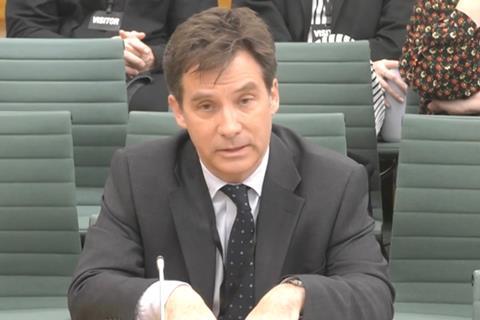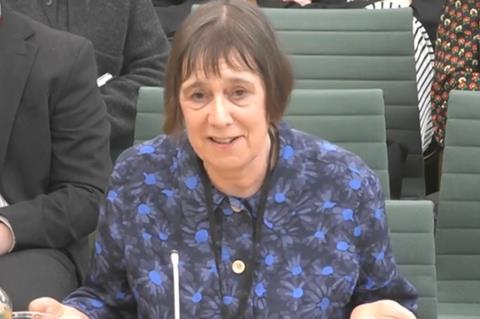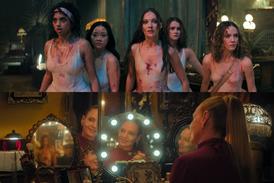
The pressure is on for the long-gestating indie tax relief to come into play in the UK, as the second day of public evidence sessions from industry representatives to the cross-party Culture, Media and Sport (CMS) Committee unfurled.
Three witness sessions took place this morning (February 21) in parliament, with One Life and Slow Horses director James Hawes; Sixteen Films producer Rebecca O’Brien; and Film4 director Ollie Madden together with BBC Film director Eva Yates.
Presently, the credit rate for films, high-end TV and video games stands at 34% (equating to 25.5% in actual relief) for all qualifying projects, regardless of budget but with an 80% cap on qualifying spend.
However, with the rise in inward investment in the UK and rising costs across the board making it harder for independent films to get up and running as they battle with the US studios and streamers for UK crew, cast and shoot space, the call for urgent additional support for independent feature making is becoming more insistent.
“Some additional fiscal support for this particular sector is essential. We could really die without it,” said O’Brien.
In its written submission, Pact proposed an increased credit of 30-40% for films with a production budget of £1m-£15m.
When asked what they would request from the chancellor in the upcoming March 6 budget if trapped in a lift with Jeremy Hunt, Hawes said: “It’s got to be about tax credits and tiered tax credits, the mix of enabling high-end TV and film, as well as British domestic film, in a way to punch its weight.”
O’Brien echoed the need for enhanced support for UK indies. She discussed the making of her latest feature, Harvest, for which she has had to patchwork together support from partners across the world to close the financing. “If we had an enhanced tax credit, for instance, I wouldn’t have had to defer my fee,” she said. “We’d be in a position where we could finish the film in confidence. It’s been a real struggle.”
Harvest is a UK-France-Germany-Greece-US co-production, that shot in Scotland, drawing on various national tax reliefs, national funds and private investment to make it work.
“Show confidence in the independent sector by supporting us with an increased tax credit. That would be really good,” said the I, Daniel Blake producer. “If I had had an additional 15% going into the market, it gives me more confidence… It gives me broad shoulders, it makes me a force to be reckoned with… rather than bringing in this embroidered carpet of different patches.”
Madden also threw his support behind the issue. “Producers pre-sell the rights to their films to get them made – that can have many benefits but one of the downsides is if you sell at a lower level than you might be able to sell the film at if you’ve made it and proved its value.
“One of the ways independent film can be commercially successful is by holding back the rights to films, particularly in North America which is one of the biggest markets. A difference in that tax credit relief would allow more producers to hold back, particularly the North American rights to their films, and then see greater upside and more value to their IP [intellectual property] once the film has been made.”
Yates said an enhanced credit would have a “transformative effect” as the industry has reached a point “where we are at risk of losing a hugely talented number of people” and to “bring some confidence back into an industry that has really been battered over past few years”.

The dominance of inward investment was made all the more apparent with much work drying up in the UK when the Hollywood strikes took hold last summer.
Of the strike impact, Hawes described it as: “Huge. We were six weeks into this American film shooting here [The Amateur] on July 14, we were shut down for nearly five months. Not a penny was spent in the meantime. No editing was allowed, everyone was shut down. The vast majority of my crew did not work during that period. I hear figures of 75% of the industry out of work during that period.”
He noted junior level crew in particular have left the industry as a result of the strikes, and that the UK needs a system in place to better support its largely freelance workforce in times of crisis.
“France, Ireland, South Korea, [these] nations have managed to sell their culture abroad, and they have systems to support their creatives in periods between jobs,” he noted.
Hawes also revealed Slow Horses, his popular Apple TV+ series, was turned down when he tried to pitch it to UK broadcasters, with a “balance” needing to be struck between inward investment and the local industry.
One Life, starring Anthony Hopkins, is his debut feature after a long-established career in TV, and has grossed almost £10m at the UK-Ireland box office for Warner Bros.
AI fears
Concerns over how to navigate the thorny issue of artificial intelligence was another major topic in today’s sessions.
“If you asked me this a week ago, I would have given you a more tempered answer,” said Hawes, referring to the recent introduction of Sora from OpenAI, a text-to-video model, in answer to a question about the threat levels AI present to filmmaking.
While it is “incredibly enabling”, Hawes said the “genie is out of the bottle” and the government and industry needs to be “angrily defending our creatives”.
Hawes had conducted some research into how long it would take technology to be able to make a show like recently-axed BBC soap Doctors using AI, learning it would be possible in three to five years. He argued the government needs to set up regulation “now”, and to look to the US that is way ahead in terms of the protections for which UK unions are now lobbying and implementing.
“AI and generative AI can be an incredible tool. It’s already being used quite extensively, particularly in post-production of films, it’s brought down the cost quite significantly,” noted Madden.
“We share all the same concerns James was talking about earlier in terms of protecting IP,” he continued. “We are behind all the work the unions in America were doing to ensure those protections. I believe absolutely in the fundamental depiction of sentient humans that AI is going to struggle to replicate.”
“We want to make sure we’re protecting people’s IP, we’re making sure what we’re not doing is presenting misinformation, those things all need to be factored in. Right now there isn’t a process to declare if something has AI in it, so that’s a process we’re discussing,” noted Yates.
Talent pipeline

Much off and on-screen talent in the UK learn their craft on TV soap operas, including Hawes, whose early credits included stints on The Bill and Holby City, both of which have since been cancelled, as has Doctors, while Casualty has drastically reduced the number of episodes it puts out a year.
He expressed worries over where the next generation of directing talent will come from, with such a reduction in opportunities on the soaps.
O’Brien echoed this sentiment. “Hard graft on soaps – that’s your apprenticeship,” she said, of where skills development has previously come from.
Both agreed current apprenticeship programmes being offered within the industry do not work particularly well. Hawes said they don’t “work within a freelance structure” and “try to put people into jobs that don’t exist”, while O’Brien added if apprenticeships worked better for freelancers, it would enable them to stay longer in the independent “nursery slopes”.
Producers “at crisis point”
Hawes supported legislative changes to protect producers’ IP, and to revise terms of trade, currently adhered to by the UK’s TV broadcasters, to include streamers. He spoke of his own experiences making the BBC show Merlin. He negotiated a contract with the production company that offered a percentage of the show’s profits when shopped globally. It went on to run five seasons.
“I still thank Merlin and the dragon regularly, it has helped me make some brave decisions,” he said.
O’Brien raised the subject of the accepted practice of fee deferral as a major weakness for the UK sector. “Director, producers have had to take big deferral in their fees, and we won’t see that until the investors have recouped their fees. I’m not sure there are any other industries where the CEO or the COO will be paid a third of what they are budgeted for,” she said.
“Too often you see producers having to defer so much of their fees, it’s unsustainable,” said Madden. “They struggle to make their next film, and don’t even stay in the industry.”
“There’s a big retention issue. Really experienced people are leaving the industry, it’s a huge problem,” added Yates.
“It’s incredibly difficult for producers to build companies, so what they don’t have is HR, a framework for how they support the freelancers who are working with them,” she later continued. “I know there is concerted effort around this… We know there are mental health issues across the industry.”
O’Brien also lamented the loss of the Creative Europe Media funding that handed out slate funding to production companies. “We lost that. That gave me about £150,000 to develop about five screenplays. I would love to have a public fund to get that seed money.”
Film4 has a budget of around £25m a year, which has stayed flat for the past nine years. BBC Film has £11m, which hasn’t increased for around a decade.
Madden wants to see bolstered support for mid-level producers: “More mid-career development – there has been a huge, quite rightly, focus on early career development and apprenticeships, but we feel there is an opportunity for more training for practitioners who are in the middle of their careers.”
“I cannot stress enough how important producers are in the indie film sector,” said Yates.
“What they do is incredibly difficult. The level of innovation we’ve seen in the past few years has been extraordinary, but it’s also reached crisis point.”

























1 Readers' comment